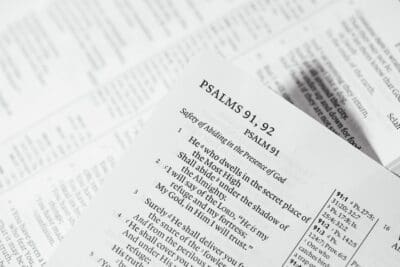A beloved relative is dying before your eyes; the syncopation of an EKG monitor punctuates each heartbeat. Bleep… Bleep… Bleep…. It’s not the sound of hospital equipment, however, that is dragging your soul into despair; it’s the conflicted thoughts and emotions swirling within. Beautiful memories from the past, tender and most lovely, are now terminated in the cold sterile confines of a deathbed. You seek to apply your faith in God’s providence, but the torrent of emotions rains down mercilessly upon you, causing you to feel hopeless.
Such an experience can be replicated in a thousand different scenarios. We’ve all been there at some point. Some of us live there. You understand quite well the concept of Philippians 4: think on things that are praiseworthy and true, with prayer and supplication, shunning worry in favor of thanksgiving, and God’s inscrutable peace will guard your heart. Indeed, this is a precious promise that is altogether true. But in some moments of crisis you find yourself so exceedingly distracted that you feel unable to control your thoughts and thus incapable of finding peace.
What then?
The Essential Problem
The Lord of glory unifies creation under the reign of Christ in the Holy Spirit’s bond of peace; the devil, on the other hand, comes to steal, kill, and destroy. He divides and conquers. It is a strategy that has been around from the inception of sin. The Son of Man sows good seed into his field, producing a harvest of life that redounds to God’s glory; the devil sows weeds that threaten to choke it out. Such is the pattern. The Father extends his hand of redemption to subdue and organize the chaotic creation under his care; sin manufactures more and more chaos.
When the chaos of sin engages one’s soul, anxiety naturally follows. The word translated anxiety in Philippians 4:6 comes from the Greek word merimnao. It gathers meaning from the words merizo, “to divide,” and nous, “mind.” This divided mind is the unhappy condition of the man whom the Apostle James describes as “double-minded, unstable in all his ways” (1:8). Such instability routinely focuses on the object of anxiety to the exclusion of God. In such moments, the sick feeling in our stomach and shortness of breath in our chest confirms that flaming darts have pierced our spiritual armor. We’ve been hit, and we are in trouble.
Reality Check
If you find yourself in this situation, you ought to seize the first opportunity to get before the Lord. Anxiety imposes a hypnotic trance, which must be broken. If you’ve ever read The Silver Chair by C. S. Lewis, for example, this sort of phenomenon is depicted in the scene in which the evil Green Lady, ruler of the underworld, seeks to bewitch Prince Rilian and his friends. You may recall that, just when she seemed to have enslaved them with her lies, Puddleglum stamps out the enchantress’s magical fire and breaks her spell. Rilian then awakes, kills the serpent, and leads the travelers to safety. Our Prince of Peace, Jesus, says, “You will know the truth, and the truth will set you free” (John 8:32).
The truth of God’s Word, regardless of our feelings, constitutes reality. The challenge, though, is opening the eyes of one’s heart to embrace this truth, especially when fiery darts are flying at us fast and furiously. A time of solitude before God is precisely what we need in such moments. We reflect divine peace after carving out time to sit in the quietness of his presence.
Humble Prayer
Truth is recognized in quietness, and then it is galvanized in prayer. While the Greek legacy says “know thyself,” the Roman says “rule thyself,” the Buddhist says “annihilate thyself,” the Muslim says “submit thyself,” and New Age religion says “love thyself,” Jesus says, “Without me you can do nothing” (John 15:5). Why nothing? Because without Christ we are stuck in the underworld of anxiety without hope of release. Sure, we can pretend to have escaped anxiety, distracting ourselves through drink or amusement, but these momentary releases are forms of denial. It is only in dependence on Christ, expressed through humble prayer, that we enjoy the peace of God that surpasses understanding.
If you find yourself in the cross-hairs of anxiety, get alone with God, read aloud his promises of salvation—which are more certain than the breath that we breathe—and, as you cast your cares upon him, may the peace of Christ be yours.








